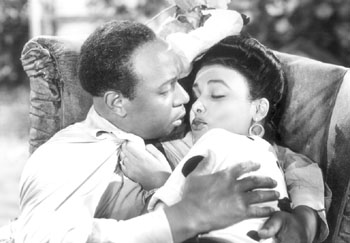![[Metroactive Movies]](/movies/gifs/movies468.gif)
[ Movies Index | Show Times | San Jose | Metroactive Central | Archives ]
Parallel Universe
'Cabin in the Sky' and 'Stormy Weather' offer a rare glimpse of African American performers
By Richard von Busack
WHILE THE REST of the crowd is watching the idealized America depicted in Pearl Harbor, take a detour to Palo Alto for a study of the real wartime United States. The double bill of Stormy Weather and Cabin in the Sky, a pair of 1943 musicals from MGM, is a look back in time to when brilliant performers were apparently as common as sunflowers. It's also like peering into a parallel universe: the two films represent rare instances of Hollywood crossing the color line. Until the 1970s, when the studio produced Shaft and its sequels, this was as close to soul as MGM ever got.
On one level, Cabin in the Sky offers an array of stereotypes. Even in its time, critics denounced the plot as patronizing. Director Vincente Minnelli recalled, "The militant black and liberal white press was highly critical of the proposed endeavor." It's a Faust story in which Petunia the good (Ethel Waters, very much the mammy) vies against a bad girl (Lena Horne's terribly alluring Georgia Brown) for the soul of Little Joe (Eddie "Rochester" Anderson). In delirium, Joe veers between a segregated Heaven and Hell. As always, Hell is more interesting, having Louis Armstrong as an idea-imp and Lucifer Jr. played by the rumbling baritone Rex Ingram. The music and dance are captured by Minnelli, a disciple of the waltzing camerawork of Max Ophuls, and a man immune to the usual studio musical practice of placing the camera front-row center and parking it until the film ran out.
Cabin in the Sky reveals its antiracist sympathies in a few minutes of John W. Sublett as the gambler Domino. "Bubbles," as Sublett was billed, was a man who could outdance Fred Astaire. He performs the Duke Ellington tune "Shine," backed up by Ellington and the orchestra. "Shine" sums up the African American experience of transforming a barb into an ornament. Some racist slang has happily gone extinct, and the slur "shine" (for shoeshine boy) is one of them. In Ellington's song, the singer turns the insult around. If they call me "shine," say the lyrics, it's because of my gleaming personality. A brave stance, but Sublett's version of it shows what that stance costs. Through the menacing, affected dignity of this terrific performance, Sublett makes the pain of racism tangible.
Stormy Weather is a more straightforward MGM musical review. Horne pines for her soldier boyfriend (Bill "Bojangles" Robinson), singing the plaintive title over the background of a studio-made thunderstorm. Other musical sequences include the phenomenal tap dancers the Nicholas Brothers, the ebullient Cab Calloway and a too-short glimpse of Fats Waller playing an upright piano with a sign on it reading "Feed the Kitty." MGM and the other studios certainly should have fed that kitty. They should have made a hundred movies with these talents; thanks to racism, they didn't. Our loss.
[ San Jose | Metroactive Central | Archives ]
![]()
 Between Heaven and Hell: Little Joe (Eddie 'Rochester' Anderson) cuddles up to one of the two women vying for his soul in 'Cabin in the Sky.'
Between Heaven and Hell: Little Joe (Eddie 'Rochester' Anderson) cuddles up to one of the two women vying for his soul in 'Cabin in the Sky.'
Cabin in the Sky (1943) and Stormy Weather (1943) play May 26 at the Stanford Theater in Palo Alto.
From the May 24-30, 2001 issue of Metro, Silicon Valley's Weekly Newspaper.